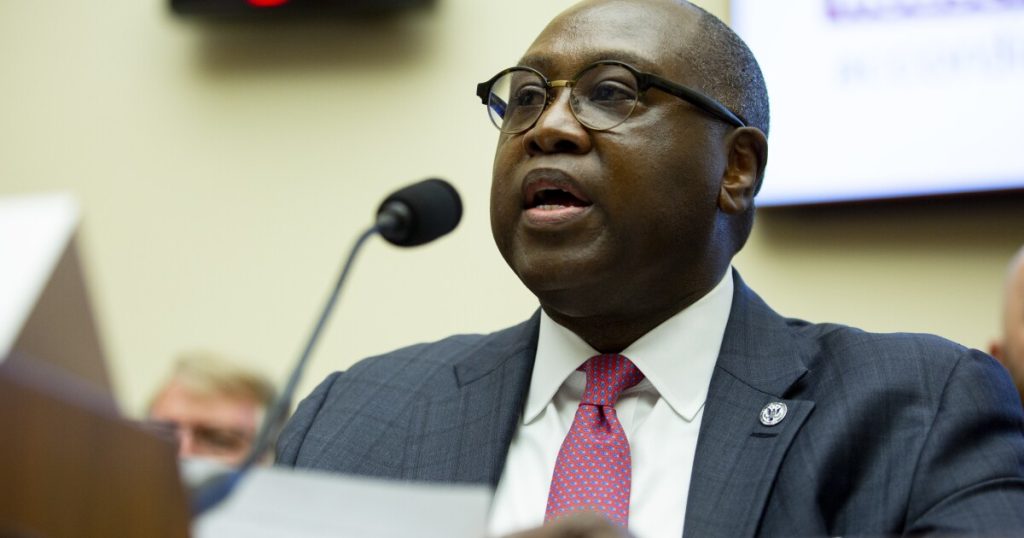Anna Moneymaker/Bloomberg
Treasury Secretary Scott Bessent Friday announced he is selecting former National Credit Union Administration Chair Rodney Hood to lead the Office of the Comptroller of the Currency on an interim basis.
“I remain steadfastly committed to serving the American people and the banking system by creating a regulatory structure that fulfills our obligations, fosters innovation, and promotes financial inclusion,” Hood said in a release. “Including those Americans who have been debanked and underserved.”
Bessent’s announcement — issued in a press release — technically selects Hood to serve as the first deputy comptroller of the OCC. Under OCC process, the first deputy comptroller is chosen by the Treasury secretary and serves as acting comptroller of the currency in the absence of a Senate-confirmed comptroller of the currency. Acting Comptroller Michael Hsu was
Hood, who served as NCUA chair from April 2019 until January 2021 and remained on the NCUA board as a member until January 2024, previously served as vice chair of the NCUA from 2005 until 2009 under President George W. Bush. Hood spent much of his career in the banking industry prior to that, serving as a Community Reinvestment Act manager at NationsBank (now Bank of America) and as the national director of community development lending at Wells Fargo.
Gregory Lyons, a partner with Debevoise and Plimpton, said Hood’s selection is somewhat surprising, as his name did not appear in earlier reports on the Trump team’s shortlist for the role. However, his prior government service may have bolstered his candidacy.
“I wasn’t aware that he was in the list of names that were being considered for the comptroller position,” Lyons said. “Under the federal vacancy act, you have to have someone who has received Senate confirmation before. Obviously he does have experience in the Trump administration, which I’m sure was also a factor.”
Hood has not been nominated to run the OCC as a Senate-confirmed head, but if he is, he wouldn’t face much opposition on the Hill according to Todd Baker, managing principal at Broadmoor Consulting and a senior fellow at Columbia University.
“He has many friends on Capitol Hill and has been confirmed before,” he said. “The only challenge I can see comes from the segment of the banking industry that abhors credit unions and anyone associated with them. At the NCUA Hood worked effectively across partisan lines, [but] that would be more challenging in the highly-politicized world of large bank regulation.”
Since his departure from the NCUA, Hood has served as a board member for AI companies Posh and Zest AI and deposit broker ModernFi. He is also an independent board director for the Federal Home Loan Bank of Atlanta, according to his LinkedIn page.
Hood has advocated for the inclusive potential of AI. In an op-ed for American Banker in 2024, Hood said that many consumers are unaware of the finer points of finance, which puts them at a disadvantage in the financial marketplace. But he added that regulators’ reluctance to embrace the potential of fintech-bank partnerships and artificial intelligence is a roadblock to Americans getting access to the kinds of financial services they need.
“There’s no question that financial illiteracy is a significant contributor to many consumers’ financial problems, particularly in underserved communities,” Hood wrote. “But literacy only helps if credit unions, community banks and other mainstream financial institutions have the tools and technologies to serve consumers of every socioeconomic level — and in today’s world, that means AI.”
Hood has also
Rodney Hood’s selection to lead the OCC is important, given the Trump administration’s recent focus on debanking. Trump and his allies have recently pushed against what they characterize as efforts by regulators to pressure banks to deny services to politically sensitive industries like firearms, energy and digital assets. At the helm of the OCC, Hood could help further policies to hamper regulatory intervention of this kind.
In a 2024
“I was very proud of the fact that we were able to create the ACCESS Initiative, which came about following the killing of George Floyd,” Hood said. “I could see that a lot of that anger was stemming from the disproportionate impact that the pandemic had had on minority and underserved communities and a lot of folks, I think, had no hope.”
Hood added that the purpose of the initiative was to help credit unions identify products, education and services that would improve the financial well-being of credit union customers — something he described as a “strategic imperative” for the NCUA.
“Thinking that hope could be really instilled through financial tools and resources, I worked with my colleagues at the NCUA to launch the group, which is an arm within the NCUA to help credit unions look at financial inclusion through training, looking at small-dollar loan products and a whole number of things that really can help,” Hood said. “When we talk about ACCESS, it almost seems like it’s a platitude, but no. For us, it is a strategic imperative and I’m delighted that it’s there.”
The administration’s selection of a Republican to lead the OCC is consequential in itself because the comptroller sits on the board of the Federal Deposit Insurance Corp. Under FDIC rules, no more than three members of the board can be from the same party, so Hood’s addition would throw off the partisan balance, says Baker. With FDIC acting Chair Travis Hill, Director Jonathan McKernan and acting CFPB head Scott Bessent already installed, personnel changes are sure to be triggered.
“Either Hill or McKernan would have to leave if the other is not appointed as Chair, and both would have to leave if someone from outside the FDIC … were to be appointed,” Baker said. “Plus two ‘non-Republicans’ would need to be nominated and approved. I can easily see the president attempting to nominate independents instead of Democrats to the minority seats, just to irritate his opponents.”

